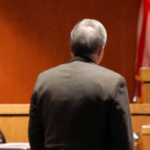Early Discharge from Probation
It is possible to file a Motion for Early Discharge of Probation and win! Although most judges are reluctant to grant an early termination of probation, a persuasive and credible motion can give the defendant an excellent chance of winning early discharge.

How to Win a Motion for Early Discharge of Probation
Every case is different, so a defendant considering filing a Motion for Early Discharge from Probation should always consult with a qualified, experienced, affordable criminal defense attorney. During a free consultation, the attorney can map out the best strategy for success. The defendant will usually need to establish that they have successfully paid all fines and restitution, completed all counseling requirements (alcohol, anger management, etc.), and finished any community service requirement. The judge may waive these requirements if there is an emergent situation or urgency due to illness or infirmity.
The Court may also consider positive efforts made by the defendant while on probation (even if not ordered by the judge). These can include:
- Efforts to acquire and maintain employment
- Engaging in volunteer and community service work
- Educational pursuits or achievements
- Significant family circumstances (new child, sick parent, etc.)
- Lack of contact with the criminal justice system
- Hardships to the defendant or the defendant’s family due to the probation.
- Seeking Discharge from Probation Following a Probation Violation
If the defendant has violated the terms of probation, achieving an early discharge will be more challenging. However, a prior violation of probation does not preclude or prevent early termination. In these cases, achieving early probation termination may not be possible without a seasoned attorney by your side.
Maximum Term of Probation
The maximum term of probation for a misdemeanor is two years, and up to three years for most felony offenses. If the judge finds a specific rehabilitation goal hasn’t been achieved, or there is an ongoing risk of harm to a victim, the Court can extend felony probation for up to two additional one-year terms.
After a defendant has completed one-half of the original felony or misdemeanor probation term, they may automatically be eligible for early consideration for discharge from probation. If the defendant has not violated probation during the preceding three months, their criminal defense attorney can file a Motion for Early Discharge from Probation.
If the defendant has not yet served one-half of the probation term, they will not be eligible for automatic consideration; however, they can still file a Motion for Early Discharge from Probation. If the judge denies the motion and automatic consideration is not mandatory, the judge is not required to explain why a motion is denied. If the motion is granted, probation is terminated, and the defendant is no longer under the court’s supervision.
Filing the Motion for Early Discharge from Probation
A motion is a written request for early termination of probation and may or may not require a hearing in court. Motions and briefs filed in court must comply with the state and local court rules. The prosecutor or probation officer may oppose early termination and file a brief response, arguing against the motion. At the hearing, the prosecutor may appear and argue against the motion. The judge will read the pleadings and listen to the arguments before deciding. The outcome may depend on which lawyer is more prepared and persuasive.

Other Factors the Judge May Consider
Unless the defendant has been on probation for an extended period (typically, at least six months in most cases), the Motion for Early Termination filing may be premature. Additionally, it is essential to demonstrate to the court how the probation has impacted the defendant.
For example, many individuals experience problems such as loss of employment positions or job advancements, inability to pass background checks successfully, restrictions on travel, and loss of benefits due to being on “active probation status.” The judge will need to consider these issues at the hearing. Although these negative consequences of probation can be influential on the court, the positive effects of probation tend to be even more persuasive. The judge will be more inclined to grant a motion if they believe the probationer benefited from probation and is less likely to re-offend.
The most compelling argument for early termination is that probation prohibits the defendant’s ability to attain employment, get a promotion, participate in their children’s school activities, obtain a professional license, or something similarly important. Probation is supposed to provide structure while defendants take steps to get their lives in order. If continued probation makes things more difficult for the defendant to progress and be rehabilitated, a judge will be hard-pressed to deny a motion for early termination.
“Am I entitled to a hearing on the Motion for Early Discharge from Probation?”
Unless you were convicted of one of the few disqualifying offenses, you are entitled to a hearing if the judge is not immediately inclined to grant the motion seeking early discharge from probation. At the hearing, the judge can only deny the motion if (1) they find a specific rehabilitation goal that has not yet been achieved or (2) if continued probation will mitigate a specific, ongoing risk of harm to a victim. If the judge denies the motion for one of these reasons, they must explain the specific reasons for not granting the early discharge to the defendant.
The offenses that disqualify a defendant from mandatory consideration of a request for early discharge include Domestic Violence (DV), Assault with Intent to do Great Bodily Harm (Assault GBH), Criminal Sexual Conduct (CSC), human trafficking, or a case where the defendant asserted the insanity defense. In these cases, the defendant will likely still get a hearing, but the judge is not required by law to explain themselves if they deny the motion.
A Middle Ground a Judge May Consider
In some cases, the circumstances may not justify an early discharge from probation. In these cases, there are alternatives that a judge may consider. For example, the terms and conditions of probation can be removed or changed. Drug and alcohol testing, mental health therapy, tether, house arrest, educational programs, community service, and curfews are examples of terms of probation that a judge has the power to discontinue. In cases where a judge declines to discharge a defendant from probation, they may also consider making probation non-reporting.
When the judge orders non-reporting probation, they eliminate all terms and conditions of probation, and the only remaining requirement is that the defendant not commit any new criminal offenses. In effect, this is just like a discharge from probation. For example, a modification to non-reporting probation without terms and conditions might be ordered if the defendant has made reasonable attempts to pay restitution, but there is still an outstanding balance.

Experienced Criminal Defense Lawyers
If you think you may be eligible to file a Motion for Termination of Probation or a Motion for Discharge from probation, please call one of the experienced, zealous, and caring attorneys with LEWIS & DICKSTEIN, P.L.L.C. If you contact us for a free consultation, we will take the time to talk with you, answer your questions, and address your concerns. We will work with you to develop a winning strategy. If there is a way to help you, we will find it.
Call us today at (248) 263-6800 for a free consultation or complete an online Request for Assistance Form. We will contact you promptly and find a way to help you.












